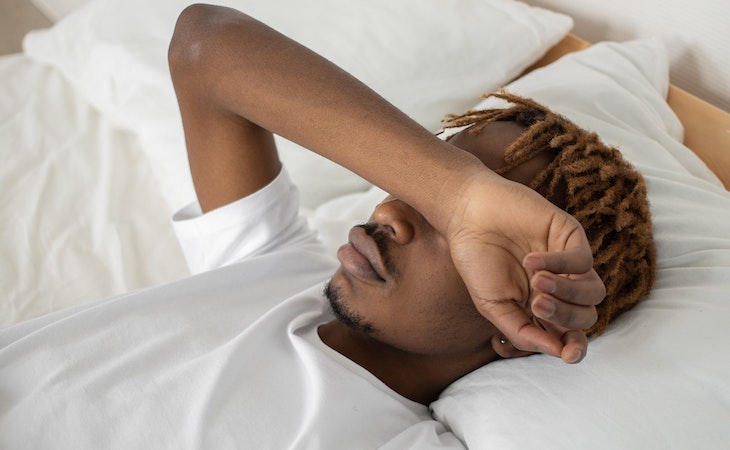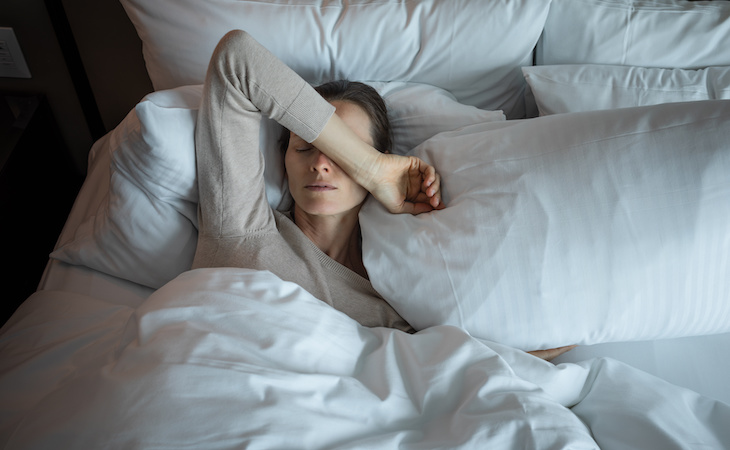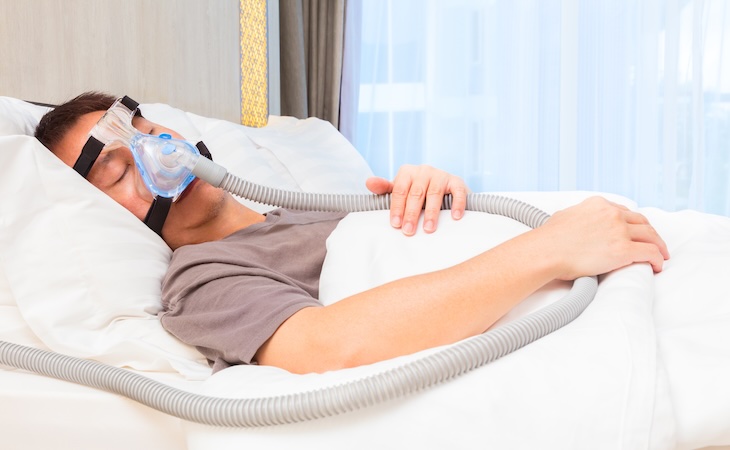Attention-deficit/hyperactivity disorder (ADHD) features symptoms that make it hard to focus and concentrate at school, work, and in social situations. ADHD persists into adulthood for most people affected by it—and it seems to be increasing. Fortunately, symptom management can greatly improve the quality of life for people affected by ADHD.
ADHD, and the anxiety and depression that frequently accompany it, can seriously affect your ability to get a good night’s sleep. This article will explore the connection between ADHD and sleep and offer tips for managing ADHD so it doesn’t ruin your sleep.
What is ADHD?
ADHD is a chronic condition that begins in childhood and is most commonly diagnosed in boys. The American Psychiatric Association (APA) says ADHD is one of the most common mental disorders affecting children. Its symptoms—inattention (not being able to keep focus), hyperactivity (excess movement that does not fit the setting), and impulsivity (hasty acts that occur in the moment without thought)—make ADHD a chronic and debilitating disorder.
ADHD impacts the individual and many aspects of their life, including academic and professional achievements, interpersonal relationships, and daily functioning. The APA estimates 8.4% of children and 2.5% of adults have ADHD. It’s often first identified in school-aged children by their disruptiveness in the classroom or problems with schoolwork.
If it sometimes seems “everyone” is being diagnosed with ADHD, it’s likely because more attention is being given to symptoms associated with inattention—rather than only focusing on the hyperactivity commonly seen in children with ADHD.
“It is possible for adults to develop symptoms that present as ADHD,” writes Samoon Ahmad, MD, clinical professor of psychiatry at New York University School of Medicine, in an article for Psychology Today, “but it is uncommon for these symptoms to appear without a history of ADHD.” He also notes, in adults, it’s important to distinguish between ADHD-like symptoms that are caused by stress and ADHD itself.
What’s the connection between ADHD and sleep?
People with ADHD, beginning around puberty, are more likely to experience shorter sleep time, problems falling and staying asleep, and an increased risk of developing a sleep disorder. Children with ADHD commonly have nightmares.
“Just as ADHD does not go away at adolescence, it does not go away at night either,” says William Dodson, MD, a board-certified psychiatrist specializing in treating people with ADHD and a medical advisor for the ADHD-focused magazine, ADDitude. “It continues to impair life functioning 24 hours a day.”
ADHD and sleep problems
Sleep problems related to ADHD tend to increase with age, typically first appearing around age 12. “Sleeping problems,” says Dodson, “tend either to be overlooked or to be viewed as coexisting problems with an unclear relationship to ADHD itself and to the mental fatigue so commonly reported by individuals with ADHD.” He adds, “Sleep disturbances have been incorrectly attributed to the stimulant-class medications that are often the first to be used to treat ADHD.”
Studies find ADHD is commonly associated with disordered or disturbed sleep—in particular, such disorders as obstructive sleep apnea (OSA), peripheral limb movements during sleep, increased sleep onset latency (takes a long time to fall asleep), bedtime resistance and difficulty with morning awakenings, sleep-disordered breathing, night awakenings, and daytime sleepiness.
Below are several of the most common sleep problems seen with ADHD:
Insomnia
Even those with ADHD who are rarely hyperactive during the day may still find their thoughts racing and spurts of energy that make it difficult to sleep. A study of 252 adult patients with ADHD found 44.4% of them were affected by insomnia disorder.
Some 64.3% of those whose ADHD was more severe had insomnia. They were more likely to have insomnia if they also experienced other medical and psychiatric issues, such as mood disorders (42%), anxiety disorder (26.8%), personality disorder (39.3%), and any substance use disorder (26.8%). Those treated for ADHD with stimulants had less insomnia compared to patients without medication.
Circadian rhythm sleep disorders
CHADD (Children and Adults with Attention-Deficit/Hyperactivity Disorder), an education and advocacy organization for people with ADHD, says the sleep disorders commonly found in people with ADHD have led researchers to suggest that an important cause may be the disruption of a standard sleep-wake cycle, or circadian rhythm.
If the circadian rhythm is off, it may be hard to fall asleep at a standard bedtime. Sleep may be regularly disrupted by wakeups throughout the night.
Sleep apnea
Doctors don’t understand why, but OSA, snoring, and other sleep-related breathing disorders are common in children and adults who’ve been diagnosed with ADHD. What’s more, OSA can have symptoms similar to those of ADHD.
In fact, attentional deficits have been reported in up to 95% of OSA patients. In people with ADHD, a high incidence (20%-30%) of OSA has been found. While OSA may contribute to ADHD symptoms, treatment of OSA appears to favorably benefit ADHD.
Restless legs syndrome
According to CHADD, studies find up to 44% of people with ADHD also have restless legs syndrome (RLS) or symptoms, and up to 26% of those with RLS have ADHD. It’s been hypothesized that sleep disruption associated with RLS may lead to inattentiveness, moodiness, and overactivity.
Likewise, manifestations of RLS—such as restlessness and inattention—may mimic ADHD symptoms. Another possibility is that RLS may simply occur with ADHD. Although RLS is uncommon among children in general, many children with ADHD also have RLS.
How to sleep better with ADHD
Haley Neidich, licensed clinical social worker, says people with ADHD “will benefit from clear rituals and routines that are simple and easy to stick to.” She says this is especially the case for those with insomnia, which is common in people with ADHD.
Neidich recommends creating, and sticking to, routines that signal your body and mind that it’s time to relax and prepare to sleep. This can include:
- Focusing on a few small tasks that trigger your body to unwind. “Taking a bath, playing some relaxing music, or reading can be helpful first steps in a bedtime routine,” says Neidich.
- Avoiding screen time for an hour before bed. “One of the most important components of this [bedtime] routine,” Neidich says, “is eliminating screens in order to stay in the present moment and begin to unwind.”
- Cutting off sugar, caffeine, and alcohol a few hours before bedtime.
- Avoiding stimulating activities and projects that require intense focus in the evening.
- Keeping the bedroom dark, cool, and quiet and using a white noise machine if necessary to block intrusive noises.
- Going to bed and waking up at the same time every day.
FAQs
Does having ADHD affect sleep?
ADHD affects every area of life, including sleep. People with ADHD are more likely to experience shorter sleep times, problems falling and staying asleep, and an increased risk of developing a sleep disorder. Sleep problems in ADHD tend to increase with age. “Adults with ADHD rarely fall asleep easily, sleep soundly through the night, and then wake up feeling refreshed,” says Dodson.
Why does ADHD make it hard to sleep?
“People with ADHD often struggle with procrastination and impulse control,” says Neidich, “both of which can lead to delaying the onset of sleep.” It can become a habit to delay a bedtime routine—which, in turn, “can negatively impact one’s mental health long term and even worsen other ADHD symptoms during the day,” she says. The association of ADHD with other mental health disorders, such as anxiety and depression, is also associated with sleep disturbances.
Does someone with ADHD need more sleep?
Neidich says researchers believe people with ADHD may require more sleep than the average “neuro-typical” adult. “In my practice,” she says, “where I regularly treat clients with adult ADHD, I find that the ability to regulate one’s sleep within the seven- to eight-hour range will not only decrease fatigue but can also improve the daytime symptoms of ADHD that impair so many other areas of functioning.”
Do you have trouble staying asleep the entire night? Here are a few common reasons why you keep waking up in the middle of the night and what to do about them.




